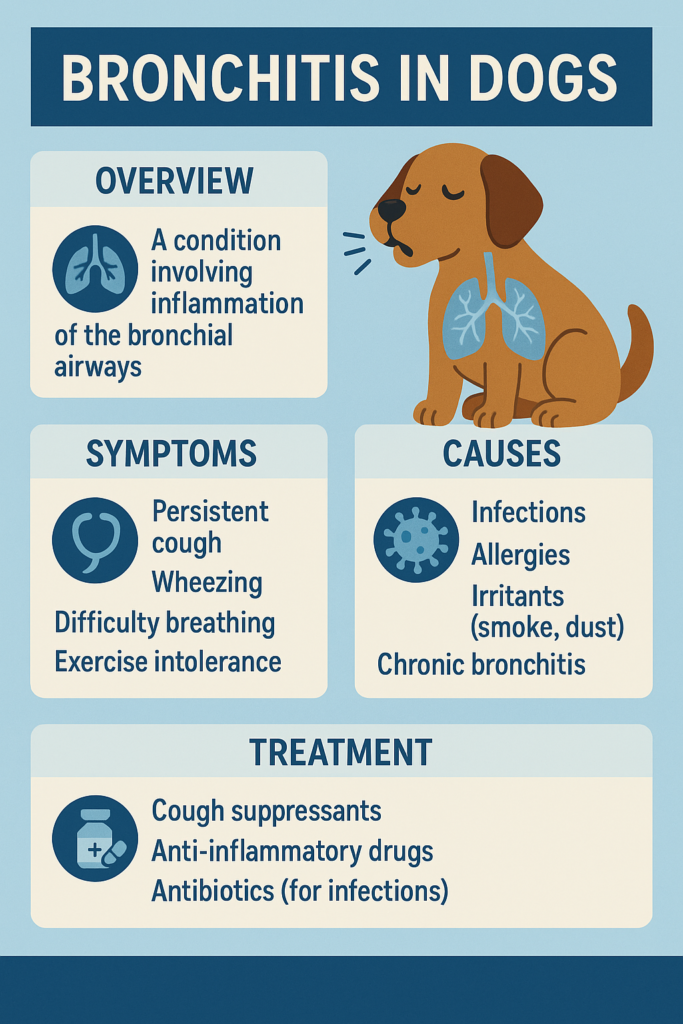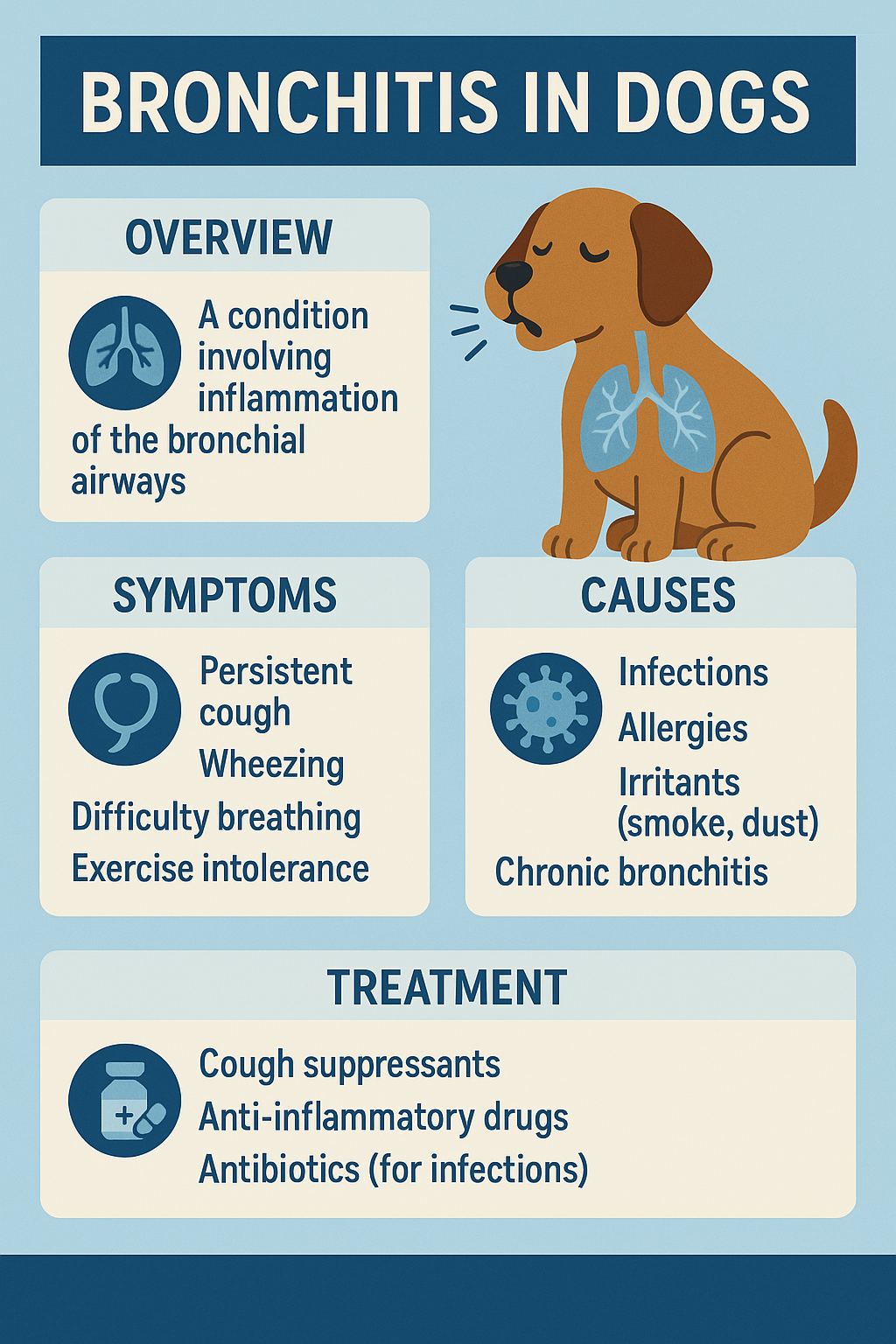Bronchitis in Dogs: What Every Pet Owner Needs to Know
Bronchitis in dogs is a condition that affects their respiratory system, causing inflammation of the bronchi—the airways leading to the lungs. While it may sound alarming, understanding the causes, symptoms, and treatment options can help you provide the best care for your furry friend. Whether acute or chronic, bronchitis can significantly impact your dog’s quality of life if left untreated. In this blog post, we’ll explore everything you need to know about bronchitis in dogs, from recognizing early signs to managing the condition effectively. With the right knowledge and veterinary support, you can ensure your dog stays happy and healthy despite this challenging condition.
Understanding Dog Bronchitis
“When a dog breathes in, air flows through their mouth or nose to their trachea, also known as the windpipe. The trachea then carries the inhaled air to the bronchi (the tubes that connect the trachea to the lungs). When these bronchial airways become inflamed, it is called dog bronchitis. In some instances, the inflammation can even extend into the lungs.”
Common Causes of Bronchitis in Dogs
Understanding what triggers bronchitis in dogs is essential for prevention and early intervention. Various factors can contribute to this respiratory condition, ranging from environmental irritants to underlying health issues.
Allergens and Irritants:
Pollen, dust, smoke, and strong odors can irritate a dog’s airways, leading to inflammation and bronchitis.Infections:
Bacterial or viral infections, such as kennel cough, are common culprits behind acute bronchitis in dogs.Environmental Factors:
Cold weather, humidity, or poor air quality can exacerbate respiratory issues and trigger bronchitis.Underlying Health Conditions:
Dogs with weakened immune systems or pre-existing conditions like heart disease are more prone to developing bronchitis.Trauma or Injury:
Inhalation of foreign objects or injuries to the respiratory tract can cause inflammation and lead to bronchitis.
By identifying and addressing these potential causes, pet owners can reduce the risk of bronchitis and promote better respiratory health for their dogs.

Recognizing the Symptoms of Bronchitis in Dogs
Early detection of bronchitis is crucial for effective treatment. Familiarizing yourself with the symptoms can help you act quickly when your dog shows signs of respiratory distress.
Persistent Coughing:
A dry, hacking cough is one of the most common signs of bronchitis in dogs, often worsening after exercise or at night.Difficulty Breathing:
Labored breathing, wheezing, or rapid panting may indicate inflammation in the airways.Lethargy and Fatigue:
Dogs with bronchitis may appear unusually tired or reluctant to engage in physical activities.Nasal Discharge:
Excessive sneezing or discharge from the nose can accompany bronchitis, especially in cases caused by infections.Loss of Appetite:
Respiratory discomfort can make eating unpleasant, leading to a noticeable decline in appetite.
If your dog exhibits any of these symptoms, consult your veterinarian promptly to determine the underlying cause and begin appropriate treatment.
Check this guide 👉Understanding Lethargy in Dogs: Best 7 Expert Tips!
Check this guide 👉Osteosarcoma in Dogs: Best 7 Expert Tips!
Check this guide 👉Diabetic Ketoacidosis in Dogs: Best 7 Expert Tips!
Acute Bronchitis in Dogs | Chronic Bronchitis in Dogs |
|---|---|
Caused by infections or irritants | Long-term condition requiring ongoing management |
Symptoms last days to weeks | Symptoms persist for months or years |
Often resolves with treatment | Requires lifelong care and monitoring |
Common in younger or otherwise healthy dogs | More prevalent in older dogs or those with pre-existing conditions |
Treatment focuses on eliminating the cause | Treatment aims to manage symptoms and improve quality of life |
Treatment Options for Bronchitis in Dogs
Treating bronchitis in dogs depends on whether the condition is acute or chronic, as well as the underlying cause. Here are some common approaches veterinarians may recommend.
Medications:
Anti-inflammatory drugs, bronchodilators, and antibiotics (if an infection is present) are often prescribed to alleviate symptoms.Environmental Changes:
Reducing exposure to allergens, smoke, or other irritants can help prevent further irritation of the airways.Humidifiers:
Using a humidifier at home can ease breathing by adding moisture to the air, which soothes inflamed bronchi.Dietary Adjustments:
A balanced diet rich in nutrients supports overall health and strengthens the immune system, aiding recovery.Regular Vet Check-Ups:
Monitoring your dog’s condition through routine visits ensures timely adjustments to treatment plans.
With proper care and adherence to your vet’s recommendations, most dogs with bronchitis can lead comfortable lives.
Preventive Measures to Reduce the Risk of Bronchitis
Preventing bronchitis involves creating a safe and healthy environment for your dog while addressing potential risk factors proactively.
Maintain Good Air Quality:
Keep your home free of cigarette smoke, strong cleaning chemicals, and excessive dust to protect your dog’s respiratory system.Vaccinate Regularly:
Staying up-to-date on vaccinations helps prevent infections that could lead to bronchitis.Exercise Moderation:
Avoid overexertion, especially in cold or humid weather, as strenuous activity can strain the respiratory system.Provide a Balanced Diet:
Feeding your dog high-quality food supports their immune system and reduces susceptibility to illnesses.Monitor for Early Signs:
Stay vigilant for symptoms like coughing or labored breathing, and seek veterinary advice promptly if they occur.
Taking these preventive steps can significantly lower the risk of bronchitis and ensure your dog remains in optimal health.
Home Remedies to Support Dogs with Bronchitis
While professional veterinary care is essential, certain home remedies can complement treatment and provide additional comfort for dogs with bronchitis.
Steam Therapy:
Let your dog spend time in a steamy bathroom to loosen mucus and ease breathing.Hydration:
Encourage your dog to drink plenty of water to thin mucus and reduce congestion.Gentle Exercise:
Short, low-intensity walks can help maintain fitness without straining the respiratory system.Herbal Supplements:
Natural remedies like licorice root (under vet supervision) may help reduce inflammation.Stress Reduction:
Minimize stressors in your dog’s environment, as anxiety can worsen respiratory symptoms.
These remedies, when used alongside veterinary treatment, can enhance your dog’s recovery process.
Breeds Prone to Bronchitis
Certain dog breeds are more susceptible to bronchitis due to their anatomy or genetic predispositions. Understanding breed-specific risks can help you take preventive action.
Flat-Faced Breeds:
Brachycephalic dogs like Bulldogs and Pugs are prone to respiratory issues, including bronchitis.Small Breeds:
Toy breeds such as Chihuahuas and Yorkshire Terriers often have delicate respiratory systems.Large Breeds:
Larger dogs like Labrador Retrievers may develop bronchitis due to allergies or obesity.Senior Dogs:
Older dogs are more vulnerable to chronic bronchitis as their immune systems weaken with age.Working Dogs:
Active breeds exposed to harsh environments, like Border Collies, may develop bronchitis from prolonged strain.
Knowing if your dog’s breed is at higher risk allows you to tailor preventive measures accordingly.
Lifestyle Adjustments for Dogs with Chronic Bronchitis
Managing chronic bronchitis requires long-term lifestyle changes to minimize flare-ups and improve your dog’s comfort.
Weight Management:
Keeping your dog at a healthy weight reduces pressure on their respiratory system.Limited Exposure to Triggers:
Avoid areas with high pollution, pollen, or dust to prevent irritation of the airways.Consistent Medication:
Administer prescribed medications regularly to control symptoms and prevent complications.Low-Impact Activities:
Replace high-energy exercises with gentle play to keep your dog active without overexertion.Routine Monitoring:
Track your dog’s symptoms and report any changes to your vet for timely adjustments to their care plan.
These adjustments create a supportive environment that helps dogs with chronic bronchitis thrive despite their condition.
Frequently Asked Questions About Bronchitis in Dogs
What is the difference between acute and chronic bronchitis?
Acute bronchitis is short-term and often caused by infections, while chronic bronchitis is a long-term condition requiring ongoing management.
Can bronchitis in dogs be cured?
Acute bronchitis is usually curable with treatment, but chronic bronchitis requires lifelong management rather than a complete cure.
Is bronchitis contagious to other dogs?
If caused by infections like kennel cough, it can be contagious. Isolate affected dogs and consult your vet for guidance.
How can I comfort my dog during a coughing fit?
Keep them calm, provide fresh water, and avoid activities that trigger coughing until they feel better.
When should I take my dog to the vet?
Seek veterinary care if your dog has persistent coughing, difficulty breathing, or other concerning symptoms.
Supporting Your Dog Through Bronchitis
Bronchitis in dogs can be a challenging condition, but with proper care and attention, it doesn’t have to diminish your dog’s quality of life. By recognizing the symptoms, seeking timely veterinary care, and implementing preventive measures, you can help your furry companion breathe easier and stay healthy. Remember, your dog relies on you to advocate for their well-being—so stay informed, proactive, and compassionate. With love and dedication, you can navigate the complexities of bronchitis and ensure your dog enjoys a happy, active life.
Do Cats Have Taste Buds? Best 7 Expert Tips! – Discover how cats experience flavors and why their taste is so unique.
Do Dogs Have Taste Buds? Best 7 Expert Tips! – Discover how dogs experience taste, their preferences, and what it means for their diet and health.
Can Cats Taste Sweet? Best 7 Expert Tips! – Discover why cats can’t taste sweetness, how it affects their diet, and tips to keep them healthy and happy.
Can Dogs Taste Sweet? Best 7 Expert Tips! – Discover how dogs perceive sweetness, which foods are safe, and tips to manage their sweet cravings responsibly.





